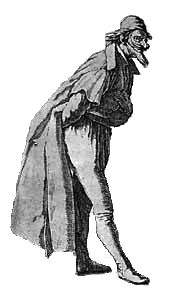Romantic comedy
The kind of comedy Shakespeare would have seen if he had been able to watch the travelling actors who visited Stratford would have been structurally as free as Latin comedy was disciplined.
Sir Philip Sidney, one of the few who wrote about the early drama, was scornful of popular plays which dramatized stories--romances--of the kind represented by the stories of King Arthur, or his own (more sophisticated) Arcadia.
One such play which has survived is The History of the Two Valiant Knights, Sir Clyomon, Knight of the Golden Shield, Son to the King of Denmark; and Clamydes the White Knight, Son to the King of Suavia.
Clymon and Clamydes
Clyomon and Clamydes is a rambling story which involves many of the traditional motifs of romance. The title suggests one of them, the rivalry between two knights; Clyomon manages to have himself knighted by a trick, depriving Clamydes of the honour.
Then there is the bad knight, Bryan Sans Foy ("Without Faith"), and the lovely heroine, Neronis, "daughter to Patranius, King of the Strange Marshes." Neronis nurses Clyomon to health when he is injured, gaining his undying love, and later finds that she has to disguise herself as a page boy in order to escape from the tyrant Thrasellus, King of Norway.
Clyomon and Clamydes also includes an example of a popular figure from the morality plays*, the Vice, here called Subtle Shift. He pops in and out of the action in typical fashion, disguises himself as Knowledge, and indulges in slapstick:
(Stage direction) Here let him slip onto the stage backwards, as though he had pulled his leg out of the mire, one boot off, and rise up to run in again.
Footnotes
-
Moral influence
The influence of the moralities is also evident in the presence of such abstract characters as Providence and Rumor (a character of this name appears in Henry IV, Part Two).
-
"Weary wandering wights"
Shakespeare may not have seen Clyomon and Clamydes, but he certainly saw plays like it, and must have been amused by the naivety of its characters, situations and language.
The play-within-the-play, "Pyramus and Thisbe," at the end of A Midsummer Night's Dream parodies these early plays. Compare Shakespeare's parody with the clumsy attempt at elevated style in the very first speech of Clyomon and Clamydes, spoken by Clamydes:
As to the weary wandering wights [people],whom waltering
waves environ,
No greater joy of joys may be,than when from out the ocean
They may behold the altitude of billows to abate,
For to observe the longitude of seas in former rate.
We may well say with Hippolyta "This is the silliest stuff that ever I heard" (A Midsummer Night's Dream, 5. 1. 210), but it is a tradition which made possible such plays as The Winter's Tale and The Tempest.
